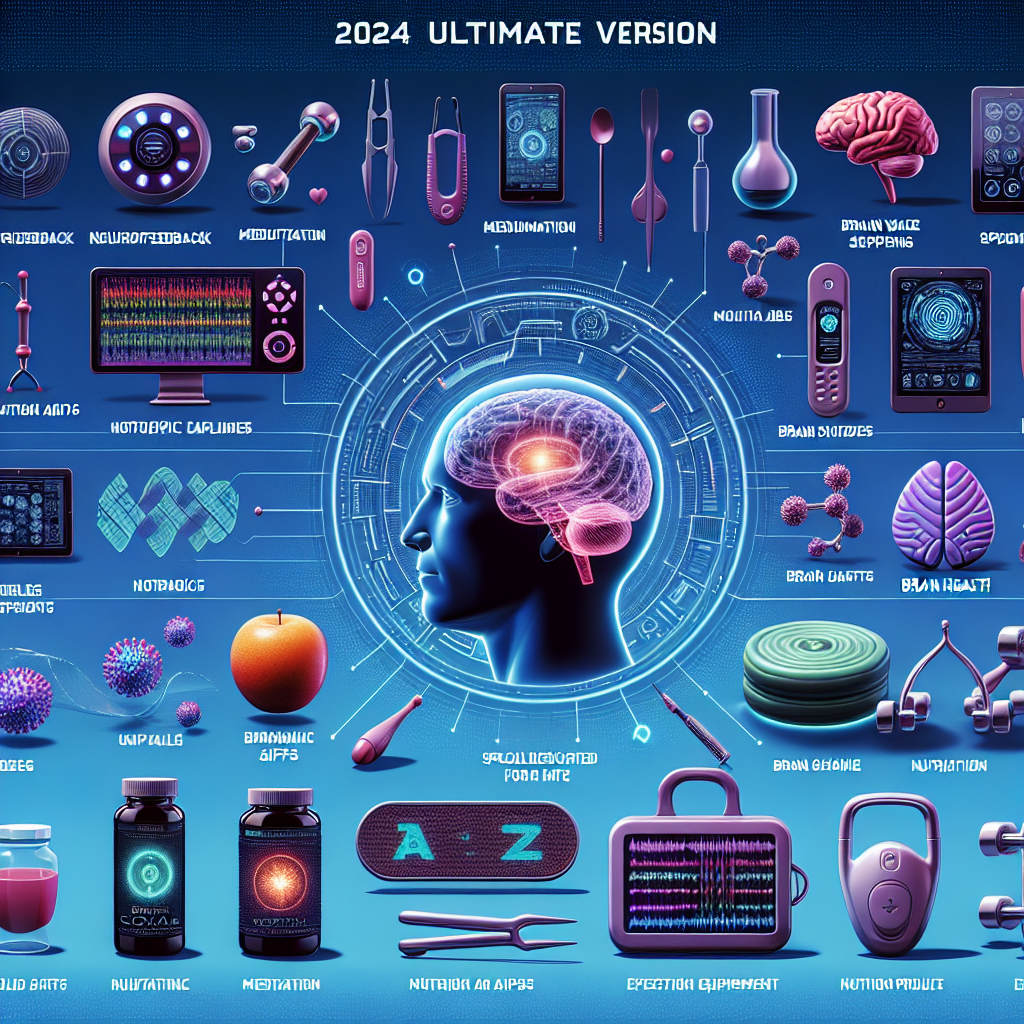Ultimate 2024 Biohacking Tools: Enhance Your Brain Health from A to Z

In the ever-evolving landscape of health and wellness, biohacking has emerged as a revolutionary approach to optimizing human performance. As we step into 2024, the focus on brain health has never been more pronounced. With advancements in technology and a deeper understanding of neuroscience, biohacking tools are now more sophisticated and accessible than ever before. This article delves into the ultimate biohacking tools of 2024, designed to enhance your brain health from A to Z. We will explore five key subtopics, each offering a comprehensive look at the tools and techniques that can help you unlock your brain’s full potential.
1. Nootropics: The Smart Drugs Revolution
Nootropics, often referred to as “smart drugs,” are substances that enhance cognitive function, particularly executive functions, memory, creativity, or motivation, in healthy individuals. The nootropics market has seen exponential growth, with new compounds and formulations being introduced regularly. In 2024, the focus is on personalized nootropic stacks tailored to individual needs and genetic profiles.
Understanding Nootropics
Nootropics can be broadly categorized into natural and synthetic compounds. Natural nootropics include herbs like Ginkgo Biloba and Bacopa Monnieri, while synthetic nootropics encompass drugs like Modafinil and Piracetam. The efficacy of these substances varies, and their impact can be influenced by factors such as dosage, frequency of use, and individual biochemistry.
Personalized Nootropic Stacks
One of the most significant advancements in 2024 is the development of personalized nootropic stacks. These are customized combinations of nootropics designed to meet the specific cognitive needs of an individual. Companies are leveraging genetic testing and AI algorithms to create these tailored solutions, ensuring maximum efficacy and minimal side effects.
- Genetic Testing: By analyzing an individual’s genetic makeup, companies can identify which nootropics are likely to be most effective.
- AI Algorithms: Advanced algorithms process data from genetic tests and lifestyle assessments to recommend personalized nootropic stacks.
- Continuous Monitoring: Wearable devices track cognitive performance and adjust nootropic dosages in real-time.
Case Studies and Success Stories
Several case studies highlight the transformative impact of personalized nootropic stacks. For instance, a study conducted by Neurohacker Collective demonstrated a 30% improvement in cognitive performance among participants using personalized stacks compared to a control group. Another success story involves a tech entrepreneur who reported enhanced focus and productivity after adopting a customized nootropic regimen.
Challenges and Considerations
Despite their potential, nootropics are not without challenges. The long-term effects of some synthetic nootropics remain unknown, and there is a risk of dependency. Additionally, the regulatory landscape is still evolving, with varying levels of oversight across different regions. Users must approach nootropics with caution, prioritizing safety and informed decision-making.
The Future of Nootropics
As research continues, the future of nootropics looks promising. Innovations in biotechnology and neuroscience are expected to yield even more effective compounds. Moreover, as public awareness grows, there will likely be increased demand for transparency and regulation in the nootropics industry.
2. Neurofeedback: Training Your Brain Waves
Neurofeedback is a cutting-edge biohacking tool that involves training the brain to self-regulate its activity. By providing real-time feedback on brainwave patterns, neurofeedback enables individuals to optimize their cognitive function and emotional well-being. In 2024, neurofeedback technology has become more accessible and user-friendly, making it a popular choice for brain health enhancement.
How Neurofeedback Works
Neurofeedback involves the use of EEG (electroencephalogram) sensors to monitor brainwave activity. This data is then displayed on a screen, allowing individuals to see their brainwaves in real-time. Through guided exercises and feedback, users learn to modulate their brainwave patterns, promoting optimal brain function.
Applications of Neurofeedback
Neurofeedback has a wide range of applications, from improving focus and attention to reducing anxiety and stress. It is particularly effective for individuals with ADHD, PTSD, and other neurological conditions. In 2024, neurofeedback is also being used by athletes and executives to enhance performance and resilience.
- ADHD Management: Studies have shown that neurofeedback can significantly improve attention and reduce hyperactivity in individuals with ADHD.
- Anxiety Reduction: By training the brain to produce calming alpha waves, neurofeedback can help alleviate anxiety symptoms.
- Performance Enhancement: Athletes and professionals use neurofeedback to achieve peak mental states and improve decision-making.
Case Studies and Research
Research on neurofeedback has yielded promising results. A study published in the Journal of Clinical Psychology found that neurofeedback led to a 50% reduction in anxiety symptoms among participants. Another study in the Journal of Attention Disorders reported significant improvements in attention and impulse control in children with ADHD following neurofeedback training.
Challenges and Limitations
While neurofeedback offers numerous benefits, it is not a one-size-fits-all solution. The effectiveness of neurofeedback can vary based on individual differences and the specific protocols used. Additionally, access to trained practitioners and high-quality equipment can be a barrier for some individuals.
The Future of Neurofeedback
As technology advances, the future of neurofeedback looks bright. Portable and affordable neurofeedback devices are becoming more widely available, allowing individuals to practice brain training at home. Furthermore, ongoing research is expected to refine neurofeedback protocols and expand its applications in mental health and performance enhancement.
3. Brain-Computer Interfaces: Bridging the Gap
Brain-computer interfaces (BCIs) represent a groundbreaking frontier in biohacking, enabling direct communication between the brain and external devices. In 2024, BCIs are being used to enhance cognitive function, restore lost abilities, and even create new sensory experiences. This section explores the latest developments in BCI technology and its potential to revolutionize brain health.
Understanding Brain-Computer Interfaces
BCIs work by detecting and interpreting brain signals, which are then translated into commands for external devices. This technology has applications in various fields, including medicine, gaming, and communication. In the context of brain health, BCIs offer new possibilities for cognitive enhancement and rehabilitation.
Applications of BCIs
BCIs have a wide range of applications, from assisting individuals with disabilities to enhancing cognitive abilities in healthy individuals. In 2024, BCIs are being used to:
- Restore Mobility: BCIs enable individuals with paralysis to control prosthetic limbs or wheelchairs using their thoughts.
- Enhance Memory: Experimental BCIs are being developed to improve memory retention and recall.
- Create New Sensory Experiences: BCIs can simulate sensory inputs, allowing users to experience virtual environments in new ways.
Case Studies and Innovations
Several case studies highlight the transformative potential of BCIs. For example, a study published in Nature demonstrated that a BCI could restore the ability to communicate in individuals with locked-in syndrome. Another innovation involves the use of BCIs in gaming, where players can control avatars using their thoughts, creating immersive experiences.
Challenges and Ethical Considerations
Despite their potential, BCIs face several challenges. The technology is still in its early stages, and there are concerns about privacy and security. Additionally, ethical considerations arise regarding the potential for misuse and the implications of altering brain function. Researchers and policymakers must address these issues as BCI technology continues to evolve.
The Future of BCIs
The future of BCIs is promising, with ongoing research aimed at improving their accuracy and usability. As technology advances, BCIs are expected to become more integrated into everyday life, offering new possibilities for cognitive enhancement and rehabilitation. The development of non-invasive BCIs is also a key focus, making the technology more accessible to a broader audience.
4. Nutrigenomics: Tailoring Nutrition to Your DNA
Nutrigenomics is the study of how genes and nutrition interact, offering insights into how dietary choices can influence health outcomes. In 2024, nutrigenomics is being used to create personalized nutrition plans that optimize brain health and cognitive function. This section explores the science behind nutrigenomics and its potential to revolutionize dietary interventions.
Understanding Nutrigenomics
Nutrigenomics examines how individual genetic variations affect responses to nutrients and dietary patterns. By analyzing genetic data, nutrigenomics can identify specific dietary needs and potential nutrient deficiencies, allowing for personalized nutrition plans that support optimal brain health.
Applications of Nutrigenomics
Nutrigenomics has a wide range of applications, from preventing chronic diseases to enhancing cognitive function. In 2024, nutrigenomics is being used to:
- Optimize Brain Health: Personalized nutrition plans can support cognitive function and reduce the risk of neurodegenerative diseases.
- Enhance Mental Performance: Nutrigenomics can identify dietary strategies to improve focus, memory, and mood.
- Prevent Nutrient Deficiencies: Genetic testing can reveal predispositions to nutrient deficiencies, allowing for targeted supplementation.
Case Studies and Research
Research on nutrigenomics has demonstrated its potential to improve health outcomes. A study published in the American Journal of Clinical Nutrition found that personalized nutrition plans based on genetic data led to significant improvements in cognitive function and mood. Another study in the Journal of Nutrigenetics and Nutrigenomics reported that individuals following nutrigenomic-guided diets experienced reduced inflammation and improved metabolic health.
Challenges and Considerations
While nutrigenomics offers promising benefits, it is not without challenges. The field is still in its infancy, and more research is needed to fully understand the complex interactions between genes and nutrition. Additionally, access to genetic testing and personalized nutrition services can be limited by cost and availability.
The Future of Nutrigenomics
The future of nutrigenomics is bright, with ongoing research expected to refine dietary recommendations and expand their applications. As technology advances, genetic testing is likely to become more affordable and accessible, allowing more individuals to benefit from personalized nutrition plans. The integration of nutrigenomics into mainstream healthcare could revolutionize dietary interventions and support optimal brain health.
5. Sleep Optimization: The Key to Cognitive Enhancement
Sleep is a critical component of brain health, influencing cognitive function, emotional well-being, and overall performance. In 2024, sleep optimization has become a focal point of biohacking, with new tools and techniques designed to enhance sleep quality and duration. This section explores the latest advancements in sleep optimization and their impact on brain health.
The Importance of Sleep for Brain Health
Sleep plays a vital role in brain health, supporting processes such as memory consolidation, emotional regulation, and neural repair. Chronic sleep deprivation can lead to cognitive decline, mood disorders, and increased risk of neurodegenerative diseases. As such, optimizing sleep is essential for maintaining optimal brain function.
Tools and Techniques for Sleep Optimization
In 2024, a variety of tools and techniques are available to enhance sleep quality and duration. These include:
- Wearable Sleep Trackers: Devices that monitor sleep patterns and provide insights into sleep quality.
- Smart Mattresses: Mattresses equipped with sensors that adjust firmness and temperature to promote restful sleep.
- Light Therapy: Devices that simulate natural light to regulate circadian rhythms and improve sleep quality.
Case Studies and Research
Research on sleep optimization has demonstrated its potential to enhance cognitive function and overall well-being. A study published in the Journal of Sleep Research found that individuals using wearable sleep trackers experienced significant improvements in sleep quality and cognitive performance. Another study in the Journal of Clinical Sleep Medicine reported that light therapy led to improved mood and reduced symptoms of depression in individuals with sleep disorders.
Challenges and Considerations
While sleep optimization offers numerous benefits, it is not without challenges. The effectiveness of sleep optimization tools can vary based on individual differences and lifestyle factors. Additionally, access to high-quality sleep optimization devices can be limited by cost and availability.
The Future of Sleep Optimization
The future of sleep optimization is promising, with ongoing research expected to yield new insights into the science of sleep. As technology advances, sleep optimization tools are likely to become more sophisticated and accessible, offering new possibilities for enhancing sleep quality and supporting brain health. The integration of sleep optimization into mainstream healthcare could revolutionize approaches to cognitive enhancement and overall well-being.
Conclusion
As we navigate the complexities of modern life, the quest for optimal brain health has become a priority for many individuals. The biohacking tools of 2024 offer exciting possibilities for enhancing cognitive function, emotional well-being, and overall performance. From personalized nootropic stacks and neurofeedback training to brain-computer interfaces and nutrigenomics, these tools represent the cutting edge of brain health optimization. As research continues to advance, the future of biohacking holds the promise of even greater innovations, empowering individuals to unlock their brain’s full potential and lead healthier, more fulfilling lives.





